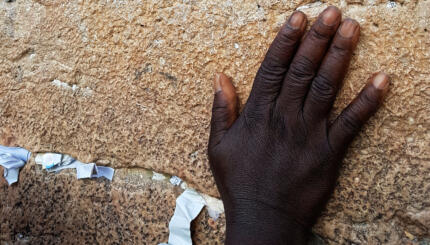Immersing in the mikveh, or ritual bath, prior to a wedding allows the bride and/or groom to quietly mark the transition from being single to being married. It can also create an island of peace, contemplation, and perspective amid the public ceremonies and celebrations that surround the big event.
Are you planning a Jewish wedding? Let us help out! Sign up for Breaking the Glass, an email series that will help guide you to the wedding that’s right for you!
According to traditional Jewish practice, a bride visits the mikveh within four days of her wedding, seven days after the end of her period. This timing is due to the laws of niddah, in which couples refrain from sexual relations during and immediately after the wife’s menstrual period and can resume relations only after the wife immerses in the mikveh.
While traditional mikve’ot (the plural of mikveh) require a woman to wait at least seven days after her period before immersing there (a rule enforced by honor code) others, such as Mayyim Hayyim in Newton, Massachusetts, allow women — whether they are coming as a pre-wedding ritual or for other reasons — to decide for themselves when to immerse.
Though not a traditional practice, some grooms have embraced the custom of immersing in the days prior to their weddings. In addition, some modern mikve’ot, like Mayyim Hayyim, welcome same-sex couples who wish to immerse before sanctifying their relationships with a wedding or a commitment ceremony. And the parents of the bride and/or groom may also find it meaningful to schedule a time to immerse.
Some partners choose to immerse at different times before the wedding, while others time their immersions at the same hour. Some people choose to keep their pre-wedding immersions private and come to the mikveh alone, or with one friend or family member. And some people choose to invite guests to celebrate with songs, poems, blessings, food and drink.
Policies at mikve’ot vary widely, so it is important to plan ahead and make sure that the mikveh you visit will welcome and accommodate you. Also, many mikve’ot require appointments and charge a fee in order to cover maintenance and staffing costs.
The procedure for immersing in the mikveh before a wedding is generally similar to any other visit to the mikveh. You can learn more about what to expect here.
For a pre-wedding mikveh ceremony for a groom, click here.
For a pre-wedding mikveh ceremony for a bride, click here.
Adapted with permission from Mayyim Hayyim, a reimagined and radically inclusive mikveh in Boston where education is as important as immersion and all Jews can come for healing, celebrations, life transitions and conversion to Judaism.

Help us keep Jewish knowledge accessible to millions of people around the world.
Your donation to My Jewish Learning fuels endless journeys of Jewish discovery. With your help, My Jewish Learning can continue to provide nonstop opportunities for learning, connection and growth.
mikveh
Pronounced: MICK-vuh, or mick-VAH, Alternate Spelling: mikvah, Origin: Hebrew, Jewish ritual bath.

Help us keep Jewish knowledge accessible to millions of people around the world.
Your donation to My Jewish Learning fuels endless journeys of Jewish discovery. With your help, My Jewish Learning can continue to provide nonstop opportunities for learning, connection and growth.



